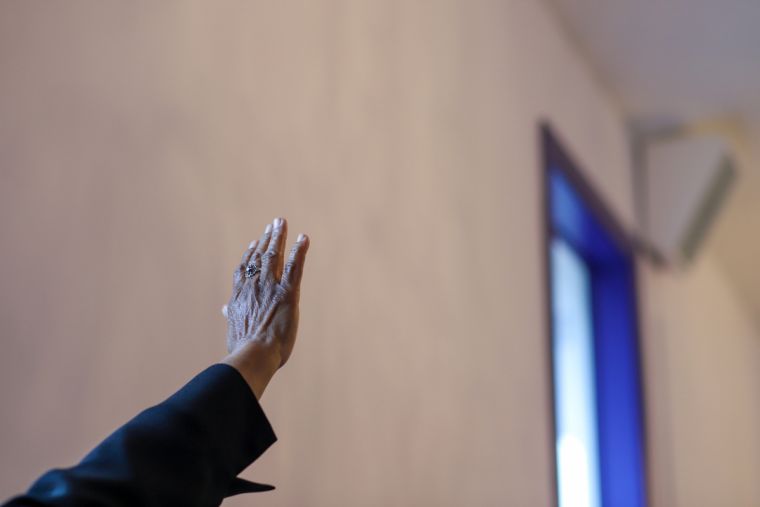Black Americans lead the way in 'spiritual vitality' and church attendance

(CP) Black Christians are more likely to say they are engaged with Scripture than all other Christians as new data shows that African Americans are more likely than all other cultural demographics to attend church at least monthly.
The American Bible Society released Chapter 4 of its State of the Bible 2023 report on Thursday, titled "Spiritual Vitality." The data in the report is based on responses collected by 2,761 U.S. adults in January. It has a margin of error of +/- 2.59 percentage points.
The latest chapter looks at how the ways in which Americans connect with God impact their beliefs about God, churchgoing habits and level of scripture engagement.
In a statement coinciding with the release of the new data, ABS Chief Ministry Insights and Innovation Officer John Farquhar Plake noted that the research found "a strong example of spiritual health and community ministry in the Black church."
"In fact, Black Americans lead the way in nearly every measure of holistic spiritual health," he added.
Specifically, the ABS discovered that "black Americans are 44% more likely than all other Americans to attend church at least monthly" and 59% more likely than other Americans to be "scripture engaged."
The term "scripture engaged" refers to those who score 100 or higher on a Scripture Engagement Scale examining an individual's "responses to 14 survey items about the frequency of Bible use and the impact and centrality [of] its message."
The report cited a 2020 article from Ann W. Nguyen of Case Western Reserve University in Ohio examining the centrality of religion in the black community.
"In black communities, religion and the church serve many functions above and beyond spiritual sustenance. Historically and contemporaneously, the black church, in addition to being a religious institution, is a social, cultural, civic, educational, and political institution that is central to black communities," the article reads.
"Because of social, economic, and institutional disenfranchisement, black Americans have traditionally had difficulty accessing public and private services. As a result, black churches tend to offer a greater number of community programs and mental health services than white churches."
The 2023 State of the Bible suggests that black Americans scored 10% higher than all other Christians on the "Spiritual Vitality Gauge" that served as a focus of Chapter 4.
Black Christians had an average Spiritual Vitality score of 76 compared to 69 for whites and 68 for Hispanics.
The SVG measures an individual's spiritual health on a scale of 0 to 100 based on self-identified Christians' "answers to nine concise questions focusing on beliefs, spiritual practices, and faith in action." Prior to discussing the SVG, the report analyzed the impact of Spiritual Temperaments, referring to the ways in which people "connect best to God or the supernatural."
Among historically black Protestant respondents, 23% fall into the "ascetic" category, meaning that they "connect best to God or the supernatural when" they are "alone and reading the Bible or praying." An additional 21% have a "naturalist" temperament, meaning they connect best with God when "surrounded by nature — the mountains, the forests, or the ocean."
Enthusiasts (14%), contemplative (11%) and sensates (11%) round out the top five most common temperaments for black Protestant respondents.
Enthusiasts are defined as those who connect best with God while "singing or praying loudly" and experiencing an emotional awakening. Contemplative people feel closest to God when God "quietly touches" their hearts and makes them feel like He is their "closest friend." Sensates feel closest to God in church, where their senses "come alive," leading them to experience God's presence.
Weekly church attendance varies based on spiritual temperament, with 48% of those with a contemplative temperament attending church weekly as opposed to just 11% of naturalists.
Naturalists are the least likely to attend church weekly, as 72% of them never or almost never attend church services. Pluralities of sensates (44%), ascetics (42%) and enthusiasts (35%) attend church weekly.
Ascetics, the most common spiritual temperament among historically black Protestant respondents, account for a plurality (32%) of those in the scripture-engaged category. By contrast, naturalists make up a plurality (44%) of the Bible disengaged, referring to those who score the lowest on the Scripture Engagement Scale. The contemplative (24%) and sensates (12%) make up larger shares of the scripture-engaged than enthusiasts (7%).
The State of the Bible report will release a new chapter for each of the remaining months of the year, while the finished product of the report will contain a total of nine chapters.











